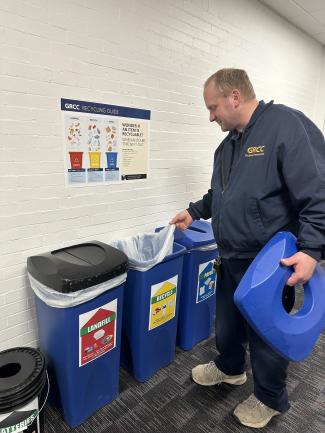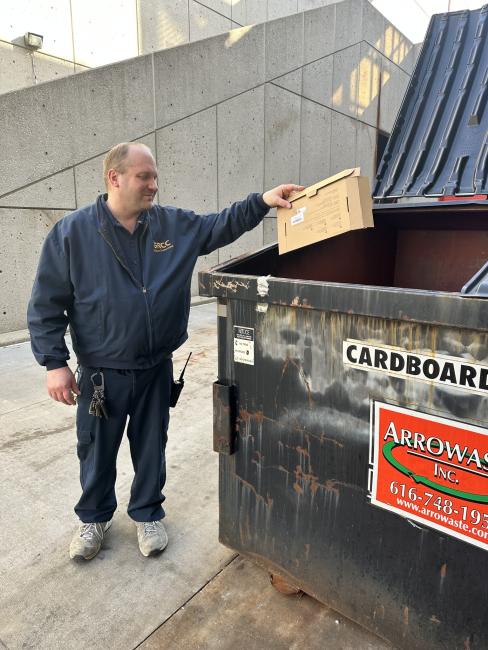May 7, 2025
Is aluminum foil recyclable? What about greasy pizza boxes? These everyday questions about recycling often go unnoticed, but Grand Rapids Community College (GRCC) has decided to increase awareness about recycling on campus by participating in the Campus Race to Zero Waste competition.
Tracking progress and setting a baseline
The eight week recycling challenge began on February 2,2025 and concluded on March 29. Schools across the nation tracked the weight of recycled materials such as paper, cardboard, bottles and cans. The total weight of recycled materials was divided by the number of people on campus (students and staff) to calculate the recycling rate per person (per capita), which was then used to compare efforts between different colleges.
For GRCC, this competition marks an exciting development in its recycling efforts. Not only did it provide visibility into the college's recycling program, but it also created the opportunity to track recycling data for the first time. GRCC’s Facilities has managed to collect and weigh 25,301 pounds of recyclables over the eight week period, plus 2,300 pounds of electronics with the help of local recycler Comprenew. This new metric will not only help GRCC compare its recycling efforts to other schools, but it will also serve as a baseline for future improvements. While the official data is still being analyzed, this initiative has undoubtedly raised awareness and laid the foundation for meaningful changes in how GRCC handles waste and recycling.
A multi-stream approach to recycling

GRCC’s recycling program is built on several streams designed to reduce waste and promote responsible disposal of potentially hazardous materials. When most people think about recycling, they think of plastic, paper and cardboard. These are the primary materials collected at recycling bins located throughout campus. In addition to these common recyclables, GRCC also provides battery recycling, with black buckets often placed near the recycling bins.
Electronics are another important part of the college’s sustainability program. GRCC offers an electronic waste (e-waste) recycling initiative that allows employees to recycle old electronics. To participate, employees simply need to contact Media Technologies to schedule a drop-off. Lithium batteries are also accepted through this program, ensuring safe disposal and recycling of potentially hazardous materials.
Another key initiative is the college's composting program. GRCC’s culinary program integrates composting into its curriculum, and campus dining kitchens participate by composting food scraps from their prep areas. Furthermore, customers at Foodology can also participate in composting, as the plates and tableware used in the dining area are all compostable.
Additionally, GRCC Police offers a SafeMeds drop-off service, which allows individuals to dispose of old or unused medications in an environmentally responsible way. The college's Facilities department also recycles scrap metal and other materials during campus renovations, further contributing to the recycling and sustainability efforts.
Contamination: a key challenge
One of the most significant obstacles is contamination. If recyclables are mixed with food waste, coffee cups or other nonrecyclable items, the entire recycling bin becomes contaminated, forcing custodians to dispose of it as trash. Misunderstandings about what can and cannot be recycled also contribute to this issue. A good rule of thumb is: when in doubt, throw it out. It’s better to throw something away than to risk contaminating the recycling stream.
Despite the challenges posed by contamination, the Race to Zero Waste competition has sparked a positive shift in student engagement and overall awareness of recycling efforts on campus. While there is no prior data to compare recycling rates before and after the competition, it is encouraging to see more people getting involved and learning about what can be recycled and where to recycle it. This heightened awareness can lead to more sustainable practices in the future.
Sustainability beyond recycling
Although recycling efforts at GRCC have made significant progress, the work doesn’t stop here. The college is committed to continuing its sustainability efforts and expanding its initiatives in the coming years by adding green roofs on several campus buildings, installing CO2 sensors that will reduce energy when buildings are unoccupied, and implementing weather driven irrigation to conserve water, and more.
The success of GRCC’s recycling program is due to the hard work and dedication of many individuals and departments across campus. Special recognition goes to Pat Baldridge and the building managers, including Esequiel Cortez, Bob Green, James Hanafin and Tom Vos, for their consistent efforts in tracking recycling data. The custodians who help maintain the bins and ensure recyclables are properly sorted deserve acknowledgment as well. Additionally, the GRCC Sustainability Team, including Klaas Kwant, Bill Faber and Jim VanDokkumburg, has been instrumental in supporting the college’s environmental initiatives. Finally, a huge shout-out to the social media team for their fantastic social media campaigns that helped promote sustainability efforts across campus.
As GRCC builds on the momentum from its first year in the Campus Race to Zero Waste, the college is positioned to further expand its sustainability efforts. Whether through broader composting initiatives, increasing awareness of proper recycling practices or encouraging students and staff to think more critically about their environmental impact, GRCC remains committed to prioritizing sustainability.
This article was written by Jada Reahm
